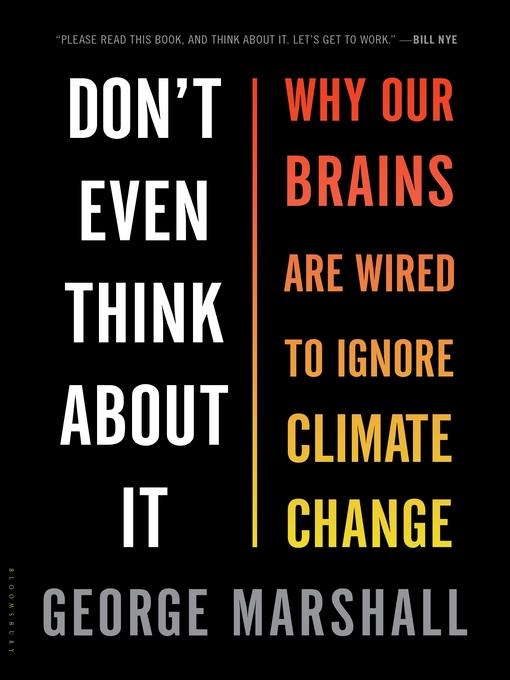
Don't Even Think About It
Why Our Brains Are Wired to Ignore Climate Change
کتاب های مرتبط
- اطلاعات
- نقد و بررسی
- دیدگاه کاربران
نقد و بررسی

June 2, 2014
“Why do the victims of flooding, drought, and severe storms become less willing to talk about climate change or even accept that it is real?” Environmentalist Marshall, founder of the Climate Outreach and Information Network, explores this and a host of other questions in an alternately enlightening, yet labored examination of the reasons people have difficulty accepting climate change, even when presented with mountains of evidence. He draws heavily upon interviews with scientists and policy makers, as well as with individuals who have faced the ravages of severe flood or drought, offering several reasons why we have a hard time accepting the reality of climate change. For one, we often believe what we want to believe: “if you are already inclined... to see climate change as dangerous, then it looks really dangerous. If you are not inclined that way, then it looks exaggerated.” Moreover, climate change is generally framed as a finite challenge that can be resolved or overcome, like winning a military victory. Marshall concludes by pointing out that multiple interpretations of climate change contain the central reason we can ignore it: “these constructed narratives become so culturally specific that people who do not identify with values can reject the issue they explain.”

July 1, 2014
Readers seeking information on global warming will not find much here, but they would do well to dig into this lively, nonpolemical account of why the average person pays so little attention.Veteran British environmental activist Marshall, founder of the Climate Outreach and Information Network, travels the world interviewing climate change deniers as well as those working on the problem. His conclusions are unsettling, to say the least. Emotional stories always trump facts, and climate change lacks the inflammatory features of, say, abortion, atheism or gay marriage. Why has it provoked fierce opposition from a minority and indifference from the general public? Marshall lists three main reasons. 1) It lacks salience, or a demand for our immediate attention. In the Stone Age, threats were nearby and obvious. Our brains evolved to give high priority to proximity-a nuclear power plant, an abortion clinic-while distant threats are a hard sell. 2) It seems controversial to most observers even though (thanks to the media) one side may feature scientists and the other cranks. 3) It demands immediate sacrifices (lower living standards, tiresome regulations) to prevent a future disaster. President Barack Obama's speeches on the subject, while admirable and necessary, never include practical steps. Reversing global warming requires government action, so U.S. opponents are overwhelmingly conservative. Yet exceptions exist. Responding to an electricity shortfall after the Fukushima nuclear power disaster, the Japanese voluntarily cut power use and sweltered without air conditioning. After 9/11, Americans yearned to make a personal contribution as they did in wartime. The author closes with "Some Personal and Highly Biased Ideas for Digging Our Way Out of This Hole."An insightful, often discouraging look at why climate control advocates have failed to get their message across and what they should do. Much of Marshall's advice is counterintuitive (e.g., drop the apocalyptic rhetoric), but it rings true.
COPYRIGHT(2014) Kirkus Reviews, ALL RIGHTS RESERVED.

June 1, 2015
Marshall endeavors to understand why skeptics fail to grasp the science of climate change. Examining psychological research, he argues that people are naturally inclined to protect their immediate economic interests over what they perceive to be a vague, long-term threat. By illustrating how the mind works, Marshall offers strategies that can be used to sway the opinions of climate change skeptics, especially those in the policymaking arena.
Copyright 2015 Library Journal, LLC Used with permission.

























دیدگاه کاربران